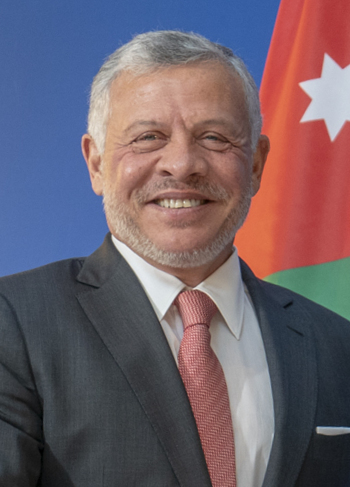Jordanian King Abdallah II Faces a Challenge in Discussing Gaza with Trump

By: Ghassan Rubeiz / Arab America Contributing Writer
Trump’s recent proposal for permanently relocating Gaza’s population to Jordan and Egypt has met with widespread rejection from Palestinians, the Arab world, and many international observers. The plan, which envisions transforming war-ravaged Gaza into a Middle Eastern tourist destination, disregards both Palestinian rights and regional stability.
When Trump announced this relocation project for two million Gazans during a press conference with Israeli Prime Minister Benjamin Netanyahu, it became evident that neither leader prioritized the two-state solution or the fragile Gaza ceasefire. The ceasefire, currently in its first phase of exchanging hostages for Palestinian prisoners, remains precarious.
Jordanian King Abdullah II’s scheduled February 11 White House visit carries particular weight given these circumstances. The King faces the delicate and daunting task of engaging with a superpower leader whose policies have significant implications for the Middle East and globally.
In his brief time in office, Trump has taken several controversial actions that have heightened tensions in the Middle East and beyond:
- Supporting continued IDF operations against Hamas in Gaza
- Lifting sanctions on violent Israeli settlers in the West Bank
- Defunding UNRWA, the UN agency serving Palestinian refugees
- Sanctioning the International Criminal Court for pursuing war crimes charges against Netanyahu and the former Israeli Defense Minister Galant
- Imposing new, maximal-pressure sanctions on Iran
Domestically and internationally, Trump has challenged established institutions by confronting federal agencies and withdrawing from the World Health Organization and the Paris Climate Agreement.
The proposed transfer of Gaza’s population carries severe implications:
- Threatens Palestinian security broadly
- Reinforces ethnic cleansing practices in both Gaza and the West Bank
- Risks undermining the Abraham Accords
- Could damage Israel’s bilateral peace agreements with Jordan and Egypt
- Escalates tensions with Iran and diminishes prospects for nuclear negotiations of significant potential for the stability of the region
- Signals potential support for renewed military action against both Hamas and Iran
King Abdullah’s upcoming White House meeting presents a diplomatic challenge. While the King might prefer to directly challenge the plan as unworkable, immoral, and contrary to long-standing US policy and international law, Jordan’s dependence on US aid and pro-Western orientation requires a more nuanced approach.
A diplomatic strategy could involve expressing appreciation for Trump’s “interest in Gaza’s people” while proposing crucial modifications to make the plan viable:
- Ensure Palestinian Participation: Reconstruction must involve Gaza’s residents in planning their future.
- Preserve Right of Return: Palestinians should maintain their right to remain on their land during reconstruction.
- Phased Reconstruction: Divide Gaza into three zones, rebuilding consecutively according to the following provisions:
- Temporarily relocate residents within Gaza during construction
- Complete each zone before moving to the next
- Ensure all residents return to permanent housing within five years
Addressing Hamas requires understanding that military resistance becomes less attractive when peaceful alternatives exist. The organization’s influence will likely diminish when Gazans see concrete opportunities for peaceful development. Democratic expression through referendums in Gaza, the West Bank, and East Jerusalem could allow Palestinians to choose their preferred governance modalities.
While Netanyahu left Washington reassured of Trump’s support, King Abdullah faces the challenge of demonstrating that unconditional backing of Israeli positions risks alienating all the Arab countries. The King’s advisors will likely craft an approach that allows Trump to claim ownership of a more balanced solution to this complex conflict.
Trump’s plan for Gaza needs serious revision to make it feasible.
Ghassan Rubeiz is the former Middle East Secretary of the World Council of Churches. Earlier, he taught psychology and social work in his country of birth, Lebanon, and later in the United States, where he currently lives. For the past twenty years, he has contributed to political commentary and delivered occasional public talks on peace, justice, and interfaith subjects. You can reach him at rubeizg@gmail.com
The views and opinions expressed in this article are those of the author and do not necessarily reflect the position of Arab America. The reproduction of this article is permissible with proper credit to Arab America and the author.
Want more articles like this? Sign up for our e-newsletter!
Check our blog here!








